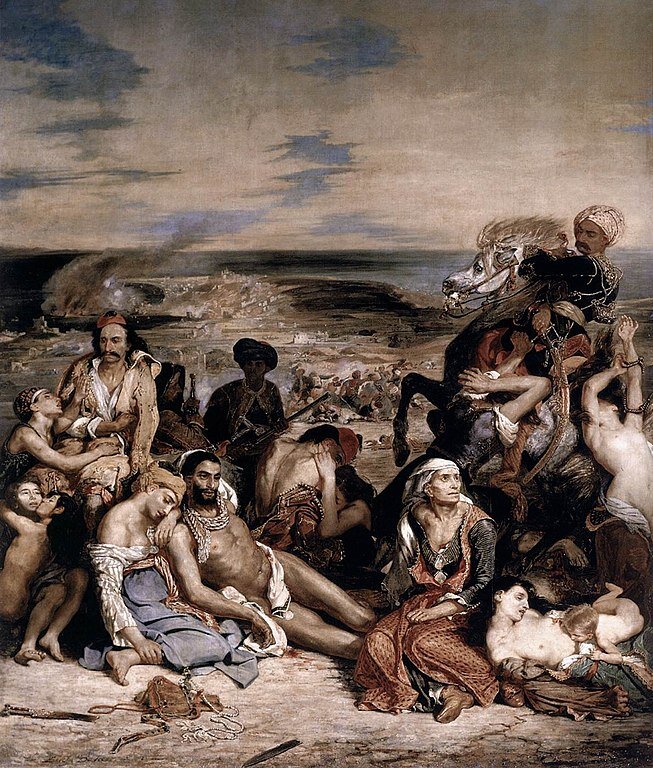The Philhellenes heroes of 1821 fought bravely as if the Greeks were their allies. We are grateful to them, we thank them and we honor them.
Le Massacre de Chios, held at the Louvre, Paris
During the years of Turkish rule, it was the journalists and correspondents of the foreign newspapers who created the Philhellenic spirit. Newspapers and magazines wrote for the Revolution of the Greeks for freedom. A great Philhellenic stream developed throughout the world, consisting of merchants, bankers, poets, painters, philosophers, artists, scientists, and military men. Philhellenic associations and organizations were formed to raise money and arms. They were sent out for the liberation of the Greeks from the barbarian dynasty. Many left their families, their goods, their belongings and comforts and not only came and fought on the side of the Greeks for the liberation from the Turkish barbarism and tyranny, but also for honoring in that way the offers of Greek civilization. 940 people came to help the revolution and 313 of them died. Other sources say that more than 1200 people came. Most of them were Germans.
James Emerson
An English philhellene and correspondent of 1821, writing from London: At every step, you see something to remind you that you are in Greece. The language, the customs, the character of the Greeks were the same as in the time of Demosthenes. Their disguise also gives the impression that they have not changed at all. They still have long wavy hair, just like Homer's heroes. The traditional clothes, the knife and the leggings show that the Greeks of today are themselves the Achaeans".
Colonel Stanhop
Colonel Stanhop says: "The Greek army is very resilient. They can travel long hours, endure great hardship and still keep their morale high. They have a love for freedom and are disobedient. "No Greek accepts the possibility of being a slave to the Turks."
Christian Muller
Christian Muller is a German Philellin. He says:
"In a short while, I shall be part of the army of the Greeks. I will express my gratitude to them, fighting and dying if necessary. I shall live only to see the liberation of the Acropolis, the Propylaea, the Parthenon. It is enough for me to kneel in these monuments, among which I now walk with my imagination. Hail my native land, hail my good friends." Admittedly moving thoughts.
Lord Byron
On March 29, 1824, Lord Byron, the great Philhellene, caught a cold and fell into bed. He died on the 7th of April. His last words about Greece are: I have given Greece my time, my property, my health, today I give her my life, what more could I do?
Santarosa
Says Santaroza: Once in Nafplio he presented himself to Prime Minister Koundouriotis, as an unknown Italian officer, and asked him for permission to fight for Greece. Mavrokordatos sent me, he tells him. Koundouriotis describes the difficulties of the war but Santaroza insists. Koundouriotis says to him that Greece accepts his service and thanks him. He also asks what military degree he wants. Sarantoza answers that he wants to be just a soldier. Koundouriotis was impressed because Sarantoza was a high military officer.
Philhellenes and the dead
Germany: 142/342
Netherlands: 3/17
France: 60/196
Hungary: 6/9
Italy: 42/137
Sweden: 4/9
England: 21/99
Denmark: 3/8
Switzerland: 11/35
Spain: 4/9
USA: 3/16
Others: 3/33












